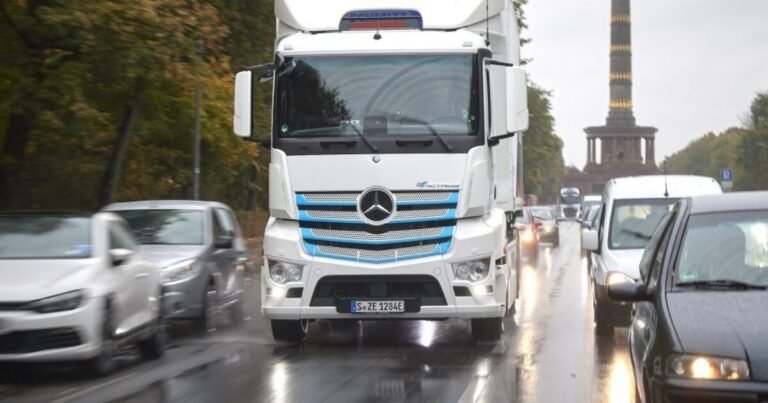Are you interested in this kind of news?
Receive them directly in your inbox. It is delivered once a week.
But perhaps the most interesting scoop was Daimler Trucks and Buses boss Martin Daum’s statement to the Tagesspiegel newspaper that he did not see synthetic fuels (known as e-fuels) as a viable alternative. With this statement, it now appears that Daimler, like Volkswagen, is on a collision course with the German auto lobby. The country’s automakers association, the VDA, sees e-fuel as a “promising way” to decarbonize trucks.
Even more surprising is the fact that not only the VDA but also the German government and the European Commission are still betting on e-fuel for trucks. In its recent 2030 Climate Action Agenda, the German government set a target that by 2030 one-third of truck traffic must be electric or powered by electricity-based fuels. The European Commission, for its part, sees very great potential for e-fuel for trucks in its long-term strategy 2050, Clean Planet for All.
The whole discussion about e-fuels – also known as synthetic fuels or converting energy into liquids – was born a few years ago in Berlin, and now it is also increasingly appearing on the agenda in Brussels. To manufacture this fuel, huge amounts of electricity are used to generate hydrogen and capture carbon dioxide, which is converted into synthetic diesel. In the automotive sector, VDA and their cronies liked the idea simply so they could continue building their beloved combustion engines. Meanwhile, the oil industry is using e-fuels as a Trojan horse to wreak havoc and delay the transition from fuels to renewable electricity.
Over the coming months, the German government will advance a strategy to achieve its goal of converting a third of truck traffic to electricity or electric-based fuels. Meanwhile, the new European Commission in Brussels will propose reviewing the Alternative Fuels Infrastructure Directive (AFID), launching future truck cleaning infrastructure.
Aside from the Daimler announcements, there are three main reasons why the German government and the European Commission should think twice before betting on e-fuel for trucks, especially in light of the fact that we will need it in sectors where there is no real alternative, such as aviation.
First of all, it is entirely possible in Germany to electrify a third of truck traffic by 2030 instead of fueling it with synthetic fuels. Not only Daimler, but also MAN, Renault and Volvo announced that serial production of battery-powered electric trucks will begin in the next three years. The trucks we are talking about have a gross weight of up to 26 tons and a range of 200-350 kilometers. Now, data shows that more than 50% of the distance traveled in Germany is driven by vehicles weighing between 3.5 and 26 tons, which is exactly the category that will be electrified first. This does not take into account that heavy trucks could also be partially electrified by 2030, for example through overhead power lines or batteries, as Daimler also plans to bring a heavier battery electric tractor truck to the market.
Second, e-fuel is an inefficient alternative and requires huge amounts of electricity that must come from renewable energy sources. Battery electric trucks or electric road systems are more efficient as the electricity is stored directly, bypassing the inefficient conversion process. So, powering all trucks in Germany in 2050 on e-fuels would require 407 TWh of electricity compared to 231 TWh for hydrogen and 89 TWh for direct electricity, while all of this would have to come from renewable energy sources. It is important to note here that the total renewable electricity production in Germany in 2017 amounted to 222 TWh. For the EU, we are looking at a higher figure of 476 TWh (direct electrification), compared to 1,241 TWh (hydrogen) to 2,191 TWh (synthetic fuels). For the overall goal of the German Climate Action Program and the EU strategy, we should not ignore energy efficiency.
Finally, due to its inefficiency, e-fuel is also incredibly expensive and will cost carriers much more. Recent research shows that even in the best-case scenario, production costs for synthetic fuels in 2030 will be two to three times higher than for regular diesel. This is while other research shows that already today, and certainly in 2025, it will be cheaper for truck drivers to operate battery-powered urban and regional electric trucks rather than regular diesel. This is mainly due to lower battery prices, less maintenance and increased efficiency of electric motors.
While e-fuel may be a good bet for a sector like aviation, which has no other way to significantly reduce its emissions, it is an expensive and inefficient alternative to trucks. Policymakers in Berlin and Brussels should put efficiency first when launching infrastructure and other support plans for trucks. Investments must go into real zero-emission alternatives, and at the same time we must bring battery production to Europe and have a battery recycling strategy. The internal combustion engine is not eternal, and to my pleasant surprise, Mr. Daum and I seem to agree on this.





